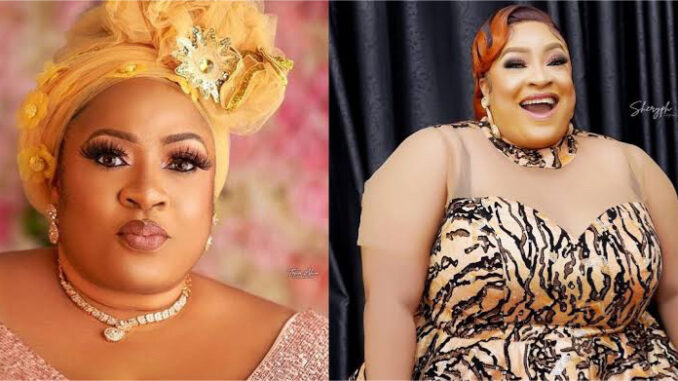
Foluke Daramola Salako, a seasoned Nollywood actress, producer, and activist, has established a career based on both purpose and passion. She was born in Ondo State on February 15, 1978, and graduated with a degree in international relations from Obafemi Awolowo University. She then went on to the University of Lagos to obtain a master’s degree in international law and diplomacy.
Since her debut in the 1998 TV series Palace, she has featured in over a hundred films, including Olokiki Oru, Jenifa, Family on Fire, Iya Oko, and Kudi Klepto. Beyond acting, she is widely recognised for her advocacy against domestic violence and her efforts in championing women’s rights. In a recent conversation with TOMI FALADE, she discussed her YouTube series, the inspiration behind her sitcom Ogba Mecho, and how Nollywood became her career path despite her background in international relations. She also shared insights on the challenges she faced breaking into the industry and how fate led her to her first role.
I understand that you’re doing a YouTube series now.
I’m doing a YouTube series for my husband’s school. It talks about the ills of society. I also shot a short film called ‘I’m Sorry’. It’s a comedy, but it has a very strong message about abuse in marriage. It’s funny, but nice.
Youalsohavethissitcom, alsoonAfricaMagic, called Ogba Mecho.
Yes. The mechanic craft, especially in Africa, a lot of times it’s a male-dominated environment. And then everybody believes that it’s for illiterates. I was trying to pass a strong message that such an industry, such a craft, is not restricted to just the illiterate and is not restricted to males. I was making it comical, but I was also sending a message.
I like to pass messages with any series or movie I do. I like to focus on topical issues that affect individuals directly, something they can learn from. I also like to make it as comical as possible. If not comical, then romantic, because I’m a romantic.
You studied international law, and diplomacy. It sounded like you were planning to become an ambassador or a diplomat. With you choosing Nollywood, it feels like an imbalance of sorts because Nollywood is not the easiest of industries. Why did you stay?
It’s not. Actually, Nollywood came as a refuge and a source of help to me in my time of need. I lost my father when I was only three. By the time I got admitted into the university, my mother, a poor widow, was struggling to support my sibling and I through school. She couldn’t maintain two children in university at the same time.
Before I left secondary school, I had already started doing talk shows on DBN TV with Chichi Okaro. I was also on Our Time on AIT. So, acting came as a way for me to balance things in my life. I had always admired people like Omotola Jalade when she starred in Mortal Inheritance. When I watched that movie, I looked at Omotola and thought, I think I can do this.
When my mentors, Tunji Bamisigbin, Ralph Nwadike, and the late Charles Owoyemi, started Palace, I had a very close friend, Bisola, whom we were watching the series together, and she said, ‘Ah, I have a crush on Antar Laniyan. I would love for him to be my boyfriend in a movie’. And I said, ‘I would love for Jide Kosoko’ to be my father in a movie.
At the time, it was just teenage fantasies. But, lo and behold, we were at AIT, just chatting in the reception area, and Uncle Charles and Uncle Tunji suddenly asked, ‘do you guys want to act’? I immediately said yes. They asked what movie set we would like to be on, and we both shouted, Palace.
Then he turned to me and said, You’re going to be Jide Kosoko’s daughter. And to Bisola, he said, you’re going to be Antar Laniyan’s girlfriend. But the twist was that she later discovered she was actually his daughter in the movie. It was like our teenage dreams just came true.
The next challenge was telling my mom. At the time, showbiz was not considered a respectable profession. Parents believed it was a path that could ruin a child’s life. My mom was worried that I was throwing away my future.
Fortunately or unfortunately, when we went for our first shoot, I ended up being featured in the teaser, the advert for Palace. One day, I was at home with my mom, and she was watching TV when the teaser came on. She turned to me and said, Foluke, is that not you?
I quickly denied it, I said, ‘I don’t know what you’re talking about’.
It was really funny. Eventually, I had to take my mentors to our house to convince her that I would still go to school, that I wouldn’t let acting affect my education, and that I would graduate top of my class.
She was worried that people would say, ‘Oh, because she’s the daughter of a widow, that’s why she’s gone astray’. So, I had to prove to her and everyone else that I could succeed in both in academics and acting.
After all your achievements in school, you decided to pursue acting full-time. What was your mother’s reaction at the time?
Throughout my time in school, it was tough, but I managed. Every week, I traveled from Ife to Lagos to shoot Palace. We were paid about N2,000 or N3,000 per episode, which sustained me. With just N500 or N300, I could take a bus from Lagos to Ibadan, and the rest of the money covered my expenses.
On set, Uncle Tunji would write the script as we were available. If we weren’t around, he wouldn’t write anything. That was how it worked. In between, I attended auditions, mostly for English-language films.
What movie gave you a big break?
The Barber’s Wisdom gave me my big break. It was produced by Uncle Tunji Bamisigbin and directed by the late Amaka Igwe, with Tunde Kelani as the director of photography. That film earned me N1.5 million, which was a lot at the time. A tokunbo car, like a Toyota Corolla, cost around N300,000 or N400,000 then, and I was excited to buy my first car.
But when I told my mother, she started crying. She didn’t want me driving from Ife to Lagos, fearing it was too dangerous. So, I had to put the money aside until after graduation.
Despite this, I had to fulfill one promise to my mom: education. She insisted I go beyond a degree, at least get a master’s, if not a PhD. I agreed to the master’s, but we settled that she should let go of the PhD. Still, deep down, I knew I might go for it someday. Over time, acting became my first love. Initially, I wanted to be a diplomat, but filmmaking provided sustenance and purpose. I stuck with it, even though some of my colleagues in other industries earned much more than I did back then.
Your breakthrough came from an English-language film, and you gained popularityonTV. ButwhenyoumovedintoYoruba films, you rose to prominence almost immediately. Was this because of your TV exposure? And why did you ultimately settle for Yoruba cinema?
I didn’t start Yoruba movies until after I had almost graduated. The shift happened because of something one of my lecturers told me. He said, “You can never speak English better than an Englishman. But if you embrace your culture, you can become a true international actor.”
He explained that even world figures like Nelson Mandela and Barack Obama are international actors, not because they perform in movies, but because they represent something unique. He advised me to tell my own story in a way that connects deeply with people. That’s what pushed me into Yoruba filmmaking.
The Yoruba film industry operates on respect. That’s the first thing you must understand. I remember one of my first Yoruba film sets in Oshogbo. When I arrived, I greeted one of the senior actresses properly, and she later told me she expected me to be distant or proud. But instead, I quickly adapted, respected the hierarchy, and that made a difference.
Financially, Yoruba films don’t pay as much as English-language productions. When I worked with actors like Kenneth Okonkwo and Uche Jombo in English movies, we earned big money. In Yoruba films, the pay was lower, but the fame was massive, almost ten times more.
